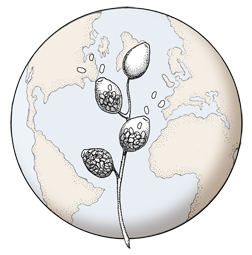References
. Phytophthora root and collar rot of alders in Bavaria: distribution, modes of spread and possible management strategies. Plant Pathology [Internet]. 2004 ;53(2):197 - 208. Available from: http://doi.wiley.com/10.1111/j.0032-0862.2004.00957.x
. Phytophthora root and collar rot of alders in Bavaria: distribution, modes of spread and possible management strategies. Plant Pathology [Internet]. 2004 ;53:197 - 208. Available from: http://onlinelibrary.wiley.com/doi/10.1111/j.0032-0862.2004.00957.x/abstract
. Primeiro relato da podrida da estipe da pupunheira, causada por Phytophthora palmivora, no estado do Parana‘. Fitopatologia Brasileira [Internet]. 2004 ;29:680 - 682. Available from: http://www.scielo.br/scielo.php?script=sci_arttext&pid=S0100-41582004000600016&nrm=iso
. Production of gametangia by Phytophthora ramorum in vitro. Mycological Research [Internet]. 2004 ;108:823 - 827. Available from: http://www.sciencedirect.com/science/article/pii/S0953756208603949
. Quantification of the susceptibility of the native flora of the South-West Botanical Province, Western Australia, to Phytophthora cinnamomi. Australian Journal of Botany [Internet]. 2004 ;52 (4):435 - 443. Available from: http://www.publish.csiro.au.proxy.library.oregonstate.edu/?paper=BT03131
. Record of decision and land and resource management plan amendment for management of Port-Orford-cedar in southwest Oregon, Siskiyou National Forest. [Internet]. 2004 :63 p. Available from: http://www.fs.fed.us/r6/rogue-siskiyou/projects/foresthealth/poc/poc-rod-fs.pdf
. Sudden oak death (Phytophthora ramorum) discovered on trees in Europe. Mycological Research [Internet]. 2004 ;108:1108-1110. Available from: http://dx.doi.org/10.1017/S0953756204221244
. Surveying for and eradicating Phytophthora ramorum in agricultural commodities. Plant Health Progress. 2004 .
. Control of Phytophthora cinnamomi with phosphite: some recent developments in application methods. Australasian Plant Conservation [Internet]. 2005 ;34:10–11. Available from: http://researchrepository.murdoch.edu.au/2427/
. Crown rot of Abies balsamea var. phanerolepis caused by Phytophthora cactorum in Virginia. Plant Disease [Internet]. 2005 ;89(4):433 - 433. Available from: http://dx.doi.org/10.1094/PD-89-0433B
. Genetic diversity of European populations of the oak fine-root pathogen Phytophthora quercina. Forest Pathology. 2005 ;35(1):57 - 70.
. In vitro leaf inoculation studies as an indication of tree foliage susceptibility to Phytophthora ramorum in the UK. Plant Pathology [Internet]. 2005 ;54:512–521. Available from: http://dx.doi.org/10.1111/j.1365-3059.2005.01243.x
. Influence of site factors on the impact of Phytophthora cinnamomi in cork oak stands in Portugal. Forest Pathology. 2005 ;35:145–162.
. Involvement of Phytophthora species in the decline of European beech in Europe and the USA. Mycologist [Internet]. 2005 ;19:159 - 166. Available from: http://www.sciencedirect.com/science/article/B7XMS-4R10WR2-5/2/37dcb413ca17af3b17f99e6101570c65
. Occurrence and distribution of Phytophthora; species in European chestnut stands, and their association with Ink Disease and crown decline. European Journal of Plant Pathology [Internet]. 2005 ;111:169-180. Available from: http://dx.doi.org/10.1007/s10658-004-1882-0
. On-Site DNA Extraction and Real-Time PCR for Detection of Phytophthora ramorum in the FieldABSTRACT. Applied and Environmental Microbiology [Internet]. 2005 ;71(11):6702 - 6710. Available from: https://pubmed.ncbi.nlm.nih.gov/16269700/
. Phytophthora kernoviae sp. nov., an invasive pathogen causing bleeding stem lesions on forest trees and foliar necrosis of ornamentals in the UK. Mycological Research [Internet]. 2005 ;109:853 - 859. Available from: http://www.sciencedirect.com/science/article/B7XMR-4RS503Y-5/2/2264e8910ee36f4e72255d6160ebf9e4
. Phytophthora nicotianae: agente etiológico da gomose da acácia negra no Brasil. Fitopatologia Brasileira [Internet]. 2005 ;30:81–4. Available from: https://doi.org/10.1590/s0100-41582005000100015
. Phytophthora palmivora. [Internet]. 2005 ;Number 12:2 pp. Available from: http://www2.ctahr.hawaii.edu/adap/ASCC_LandGrant/Dr_Brooks/BrochureNo12.pdf
. Phytophthora ramorum: integrative research and management of an emerging pathogen in California and Oregon forests. Annual Review of Phytopathology [Internet]. 2005 ;43:309. Available from: http://www.annualreviews.org/toc/phyto/43/1
. Phytophthora species from declining Austrocedrus chilensis forests in Patagonia, Argentina. Mycologia [Internet]. 2005 ;97:218-228. Available from: http://www.mycologia.org/cgi/content/abstract/97/1/218
. Proceedings of the sudden oak death second science symposium: the state of our knowledge. Sudden oak death second science symposium: the state of our knowledge [Internet]. 2005 :571 pp. Available from: http://www.fs.fed.us/psw/publications/documents/psw_gtr196/
. Relationships between health of Quercus robur, occurrence of Phytophthora species and site conditions in southern Sweden. Plant Pathology. 2005 ;54(4):502 - 511.



 ]
]